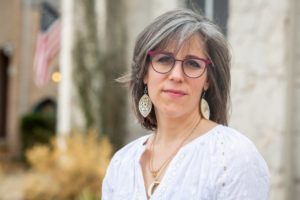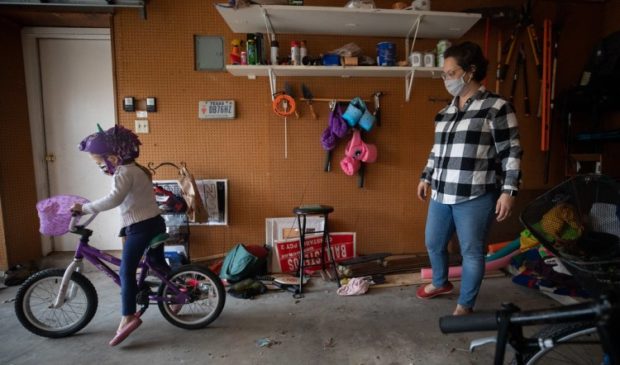‘Panic mode’: Austin ISD needs to evaluate 800 students for special ed. It doesn’t have the staff to do it.
Thursday, March 11, 2021 by
Claire McInerny, KUT More than 800 students in the Austin Independent School District are being denied their legal right to a special education evaluation.
An evaluation is the first step in the process to get special education services. Without one, there is no official help in class. So if a child who struggles to read out loud never gets a diagnosis of dyslexia, she can’t work with a reading specialist. Her teacher might not know to give her more time on reading assignments.
Many AISD families have been waiting for these evaluations for months. Some have been waiting over a year. And families will continue to wait until the district replaces the staff that is leaving in droves because of what they say is a toxic workplace.
A desperate need for resources
Andrea Troncoso is the mother of two of those 800 children waiting to be evaluated. She has three kids in AISD – in pre-K, kindergarten and first grade. She suspects all three might need some sort of special education. But right now, it’s just a hunch.
Last spring, she and her husband asked their daughter’s school to evaluate her because they noticed she had behavioral issues they didn’t know how to address.
“She’s very black and white,” Troncoso said. “One day it’s going to be, ‘I wanted the pink shoes, now I want the blue shoes.’ ‘I wanted two braids, now I want one.’ There’s some OCD stuff thrown in there. She becomes very anxious about it.”
The school said it would evaluate her, but then the pandemic hit and evaluations stopped. Troncoso heard nothing over the summer or when the fall semester began. She still hasn’t been contacted to have her daughter evaluated.
“Of course we go to Google,” Troncoso said, “(to) the checklist of symptoms for children on the spectrum or children with anxiety or OCD. … I’m not looking for a label for my kid. She’s an amazing, incredibly intelligent little girl, but what I’ve desperately been looking for is resources.”
Troncoso also suspects her eldest son might have a reading disability, because he complains about letters moving around on a page. But it was the same story with him: She reached out to the school. It said it would evaluate him. She hasn’t heard back.
Troncoso says the year has been stressful with all three kids doing virtual learning. She knows legally her children should have gotten services if they need them, and she’s worried that an entire year without any help could harm how they learn.
“I really hope I’m helping and not hindering,” she said. “I’m not an educator. I’m not their teacher. I hope that they are able to build on the building blocks that they’re learning now, especially being so young and learning the very basics.”
Staff exodus
School psychologists known as licensed specialists in school psychology, or LSSPs, are the gatekeepers into special education. When a parent asks a school to evaluate a child, the LSSP is the first stop. He or she does a variety of assessments to gauge if there are any learning disabilities or other diagnoses that would require special education services. That includes dyslexia, autism, ADHD or other psychological disorders. The LSSP then writes a report, which is used to decide what supports the student needs.
As of December, there were 16 LSSPs employed with AISD. There are more than 10,000 students receiving special education this school year. That’s one LSSP for every 625 students.
Ten years ago, AISD had 32 people in these positions. But as people left, the district did not replace them. Instead, it has relied on outside consulting firms to do evaluations.
KUT talked to nine current and former LSSPs about why they left the district. The overwhelming response: a hostile work environment within the Special Education Department.
An ‘untenable’ workload
Melissa Matthews loved her work as a speech language pathologist in AISD. Her last position was her dream job: helping students without verbal skills use technology to communicate.
“People would say, don’t leave, Melissa, and I would say, don’t worry – you’ll have to wait until I retire,” she said.
But in 2019 Matthews quit, well before retirement age.

Melissa Matthews says the work environment within the Special Education Department was “abusive.”
“It definitely wasn’t anything that was planned,” she said. “It was definitely a decision that came because the environment was untenable, and I had to put my mental health and my family’s health in front of staying there.”
Matthews says she worked under two special education directors who created what she called an “abusive” work environment. She says staffers were bullied and the caseloads kept getting bigger and bigger. One of the final straws was a policy that required special education staff to account for every minute of their day – every time they ate, or drove to campus or made a phone call. That, added to a workload that was already out of control.
“Basically I went to work, came home, sat down at the table and worked,” Matthews said. “On the weekend I worked. It was awful.”
After Akweta Hickman became head of the department in 2019, some staffers quit immediately because they didn’t like the changes she brought.
And as people kept quitting and weren’t replaced, caseloads became unmanageable.
When Alana Riddle became an LSSP with the district three years ago, she was assigned to two campuses. By the time she left in December, she was trying to manage evaluations for six schools.
One thing that bothered her was being told to focus on kids getting their first evaluations. Federal law requires children receiving special education services to be reevaluated every three years because abilities and disorders can change. Riddle said when the district got behind, it told staff not to prioritize these reevaluations.
“If it’s been years … (since) a kid has been tested, you’re implementing a (plan) without current evaluation data,” she said.
By law, an LSSP must complete an evaluation in 45 days. That means interviewing the student, parents and teachers, and writing up a report. Riddle had a caseload of 40 students when she left; meeting that time frame was impossible.

Alana Riddle says the entire special education system at AISD seemed broken.
Many times, she said, huge changes were implemented without staff’s knowledge.
“The communication had gotten so bad and the demands were just way too high,” Riddle said. “It was difficult keeping up with two campuses in these conditions. With six, it just felt impossible.”
She said leaving was hard because she loved her students, but the entire system seemed broken.
“Toward the end of my time there, things started to get a lot uglier and there’s just kind of this sense of desperation in the whole district because they are in panic mode,” Riddle said. “Which, we all were.”
Riddle, who began working as an LSSP in Round Rock in January, said the difference is stark.
“With AISD, I would look at my caseload and was like, there’s no way,” she said. “You’ll get ahead but you’re still behind. But now it’s like – OK, I can make a to-do list and actually check things off and take things one thing at a time.”
A cultural reckoning
Hickman resigned earlier this month, but many staff members say her departure doesn’t feel like a solution.
“I think it’s unfair to blame one person,” Matthews said.
She said the assistant special ed directors, former Superintendent Paul Cruz and other administrators upheld the culture of Hickman and her predecessor.
“If they felt something was wrong, they were in a position to stand up,” Matthews said, “and they didn’t.”
New leadership is now the task of Elizabeth Casas. Casas became the district’s chief academic officer in October and will hire the next special ed director.
Casas says she recognizes that one reason it has been so hard to hire LSSPs is because of the department’s reputation.
“Are they hearing the murmuring out in the community of the people who have left?” she said. “That’s incumbent on me to work through those climate and culture issues within the department. We have to make sure that our staff feel valued and that we are looking at their caseload and providing them with the resources and everything they need to get their jobs done.”
She said she plans to meet with the special education staff to discuss the department’s culture.
In the meantime, she wants to get all those 800 students evaluated. The district will have to rely on contractors while it tries to get fully staffed. Casas said the district is also planning Saturday evaluations to try and move through the list.
For many parents, like Troncoso, the waiting got to be too much. She eventually went to a private testing facility and paid $300 to have both of her kids evaluated. Not only did she have to pay out of pocket for the evaluation, but her daughter also didn’t get the right type of evaluation. So she still has no diagnosis.
Without that diagnosis, there’s not much her teachers can do.
“There is a whole bunch of us out there who are muddling through,” Troncoso said. “I think especially the kids that are virtual are falling through the cracks.”
Casas says she’ll take responsibility for the fact the district is failing too many kids.
“I would tell our families that I’m sorry,” she said. “I own where we are at this point, irrelevant of Covid and everything else. I am really sorry that it’s taken this long to get it done. Trust us that we will get this right. Within the next month or so, we are going to work day and night to get the evaluations caught up, so (families) can regain trust in our system.”
This story was produced as part of the Austin Monitor’s reporting partnership with KUT.
The Austin Monitor’s work is made possible by donations from the community. Though our reporting covers donors from time to time, we are careful to keep business and editorial efforts separate while maintaining transparency. A complete list of donors is available here, and our code of ethics is explained here.
You're a community leader
And we’re honored you look to us for serious, in-depth news. You know a strong community needs local and dedicated watchdog reporting. We’re here for you and that won’t change. Now will you take the powerful next step and support our nonprofit news organization?








